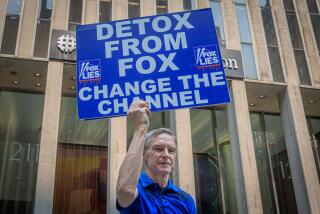Bit by Bit, We’ve Sold Out America’s Birthright, Truth
- Share via
Whatever the outcome of the Iranian arms deal investigation, the incontestable fact emerging from the episode is that Americans had to push and prod to get at the truth. In all the agitation and excitement over the undercover transfer of funds to the contras, the most important issue may be the people’s right to be accurately informed by their government.
A strange notion has gained ground. It is the idea that the government has options with respect to truth. This view gained considerable favor in 1947, when Congress authorized the government to practice secret violence, deceit and subversion as essential parts of the conduct of U.S. foreign policy. The terms of the act setting up the Central Intelligence Agency, however, specifically confined undercover actions to foreign territory.
The justification for those actions was that we were living in a predatory, cloak-and-dagger world and that the only way to deal with a totalitarian enemy was to imitate him.
The trouble with that theory is that while we do live in a world of plot and counterplot, it also is a world of cause and effect. Whatever the cause for the decision to legitimize deceit abroad, the inevitable effect is the practice of deceit at home. Long before the Iran-contra episode, the government was doing one thing and saying another. In 1959, for example, the United States was secretly involved in an attempted coup against the government in Laos.
The fatal defect in the 1947 act authorizing dirty tricks abroad has become clear. An integral part of dirty tricks is the cover-up. How does one compartmentalize the world so that the American people can be sealed off from cover-up explanations in order to comply with the legal requirement that they not be subjected to the deceit that accompanies undercover activities?
In 1971, President Richard M. Nixon and Pentagon officials declared that no military operations had been conducted against Cambodia. It was later established that more than 3,000 bombing operations had been carried out against the country.
The main danger in such dishonesty is not just the break with truth but the things we did that we had to deny. If truth is to mean anything, it must be a total process, including policies and actions of government that require neither concealment nor later denials or apologies.
An even more important question: Why is it all right to lie to foreigners? Why the assumption that moral issues cease at the water’s edge? Two hundred years ago, the young men who founded the United States proclaimed their respect for the “the decent opinions of mankind.” The term “un-American activities” applies in its most fundamental sense to the notion that official lying is acceptable if the practice is confined to foreigners.
Truth in government will not assert itself. It has to be institutionalized. Truth needs a form of its own that transcends the men who happen to be in charge of the machinery of government at any given moment. That is what is meant by a government of laws rather than of men. But this design has been slipping away from us. We have permitted exceptions from principle in the operation of our society, exceptions that should not be accommodated. We have made it possible for men in government to become bigger than the laws they have sworn to uphold.
The problem is not resolved just by changing the men in power. The problem can be met only by restoring and bolstering the basic principles of the society. It would be interesting to see how the Supreme Court would view the constitutionality of any government agency that can spend large sums without public accounting, or make vital decisions that affect foreign policy without constitutional sanction, or engage in subversion abroad.
It will be said that our style in the international arena is dictated by others, and that we have no choice but to play the game the way others play it. Yet it is precisely because we have to take the world as it is that it becomes necessary to rise above the game if we wish to make our mark.
We cannot expect to succeed in the world political arena by being more volatile than anyone else in the game of combustible anarchy. We will succeed only as we represent a rallying center in the world for a less hazardous and more sensible future for all people. Our energies will have a far greater effect if we apply them to the possibilities for human progress rather than to shadowy balance-of-power strategies.
The challenge before the American people is to create an environment in which truth can live a less unnatural and precarious existence, and in which the right to know doesn’t depend on special dispensations.
More to Read
Sign up for Essential California
The most important California stories and recommendations in your inbox every morning.
You may occasionally receive promotional content from the Los Angeles Times.










